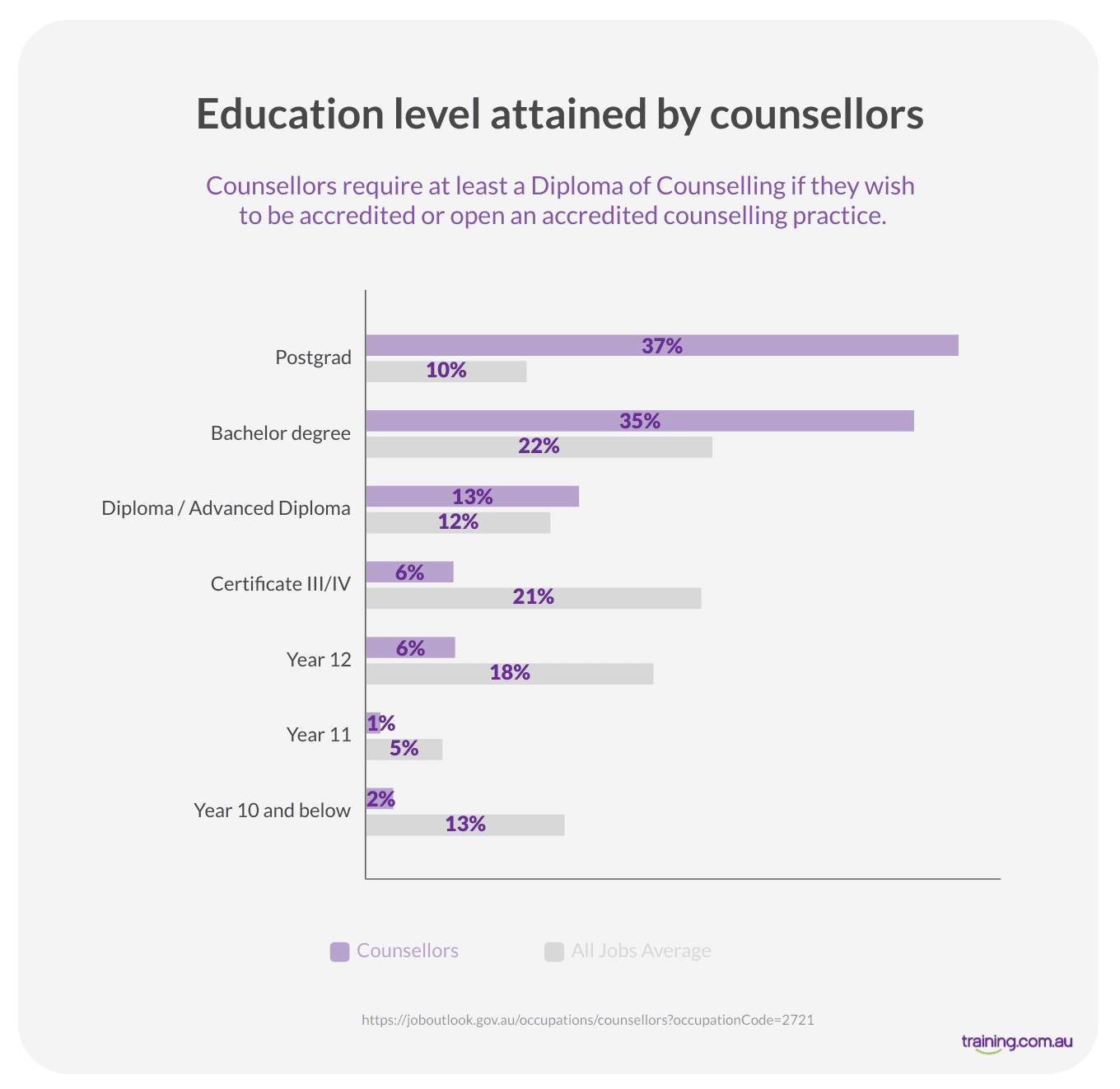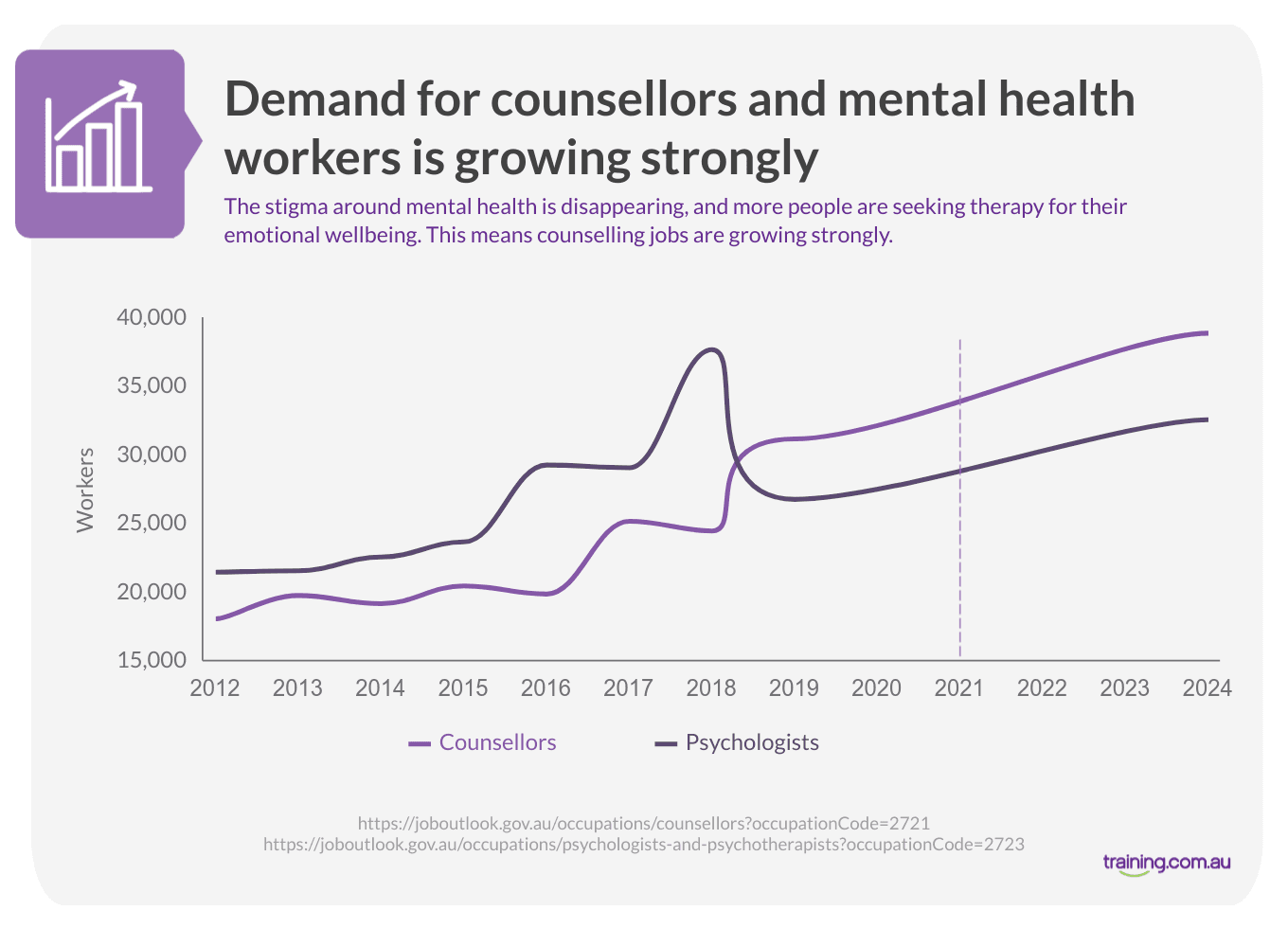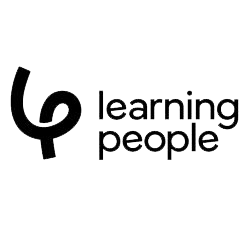In this post
- How to become a counsellor in Australia
- Study relevant counselling qualifications
- Getting professional counselling accreditation in Australia
- Starting your counselling career
- Considering whether a counselling job is for you
- What does a counsellor do?
- How much does a counsellor earn?
- Counselling skills that you need to succeed
- Browse Counselling Results
How to Become a Counsellor in Australia 2024: the Ins and Outs of This Fulfilling Role
In this post Show
- How to become a counsellor in Australia
- Study relevant counselling qualifications
- Getting professional counselling accreditation in Australia
- Starting your counselling career
- Considering whether a counselling job is for you
- What does a counsellor do?
- How much does a counsellor earn?
- Counselling skills that you need to succeed
- Browse Counselling Results
A career in counselling is suited to people who want to support the mental health and wellbeing of others and make a positive difference in people’s lives. Passionate and empathetic counsellors feel rewarded when they see clients tackle challenges in their lives. Counselling in Australia is a much-needed profession that offers strong, well-paying, and flexible employment prospects.
If you’ve been asking yourself: “How do I become a counsellor?” This article has all the answers. From what skills you need, what to study, and what to expect from the counselling industry.
How to become a counsellor in Australia
- Get qualified with a Diploma of Counselling (CHC51015)
- Get professional accreditation by registering with the Australian Counselling Association (ACA) or the Psychotherapy and Counselling Federation of Australia (PACFA)
- Choose an organisation or sector to work in and apply for jobs
Counsellor job description
Counsellors work with clients for short periods of time to help them reflect on and address practical and immediate issues in their lives. These problems could include grief, making difficult transitions (such as a divorce or the birth of a new baby), relationship or career issues, poor self-esteem, and more.
During counselling sessions, counsellors encourage clients to draw and build on their own insights and skills to solve these issues and return to a better state of emotional wellbeing.
Study relevant counselling qualifications
In Australia, counselling is not a regulated profession, meaning that there are no particular qualifications or accreditations required to become a counsellor. Although some states (including NSW, VIC, QLD and SA) do require that counsellors abide by a code of practice, which is provided by the Australian Counselling Association (ACA).
That said, studying counselling in Australia is an important step towards becoming a professional in the field. A career in counselling is not the role to dive blindly into. Counsellors are responsible for the wellbeing of their clients (as well as their own wellbeing). If they’re underprepared for the job then they will not be capable of looking after their clients or themselves responsibly.
A qualification shows prospective clients and employers that you understand what the job entails, and how to do it effectively and ethically. Courses will also give you practical experience while you’re still learning, so you’ll be fully prepared for the workforce upon completion.
Which counselling course is right for you?
There are many different study options available for those wanting to pursue counselling, all at different qualification levels. Before studying counselling, it is important to know which course is right for you.
A popular counselling certification is a one-year Diploma of Counselling (CHC51015) which can be studied at a TAFE or other vocational training provider. This counselling qualification is required for professional accreditation and to start your own accredited counselling practice.
However, many advertised counselling jobs require a three-year undergraduate degree such as a Bachelor of Counselling, or a Bachelor of Community Services with a counselling major. Postgraduate qualifications such as a graduate diploma or a masters degree are available for those with existing qualifications.
Ongoing professional development is also recommended throughout your career so you are always up to date with the latest skills and code of practice.

Getting professional counselling accreditation in Australia
As counselling is an unregulated field, counsellors don’t technically need accreditation to practice as a professional counsellor. However, it’s a good idea to become a member of a professional counselling group such as the Australian Counselling Association (ACA) or the Psychotherapy and Counselling Federation of Australia (PACFA) which accredits counsellors and psychotherapists.
Accreditation is well-regarded in the field. It will improve your employment opportunities and your reputability, along with offering you affordable professional insurance, and further education and training.
Starting your counselling career
Once you’re an accredited and qualified counsellor, you can seek counselling careers in a diverse array of organisations and industries, such as:
- Schools and universities
- Workplaces
- Community healthcare centres
- In-patient settings
- Welfare agencies
- Aged care settings
- Palliative care settings
- Settlement services for refugees
- Crisis phone lines
Many counsellors also work in private practice, either on their own or as part of a practice team. Counsellors working in private practice are self-employed and offer services to members of the general public.
5 Types of Counselling Jobs | The Essential Guide
Counselling is an important profession in supporting Australia’s wellbeing. It also provides well-paying, flexible job opportunities, with plenty of existing and expected future demand for counsellors through a diverse range of settings. Learn more about five types of counselling jobs.
Considering whether a counselling job is for you
Nobody can be a perfect counsellor without some experience and training in counselling skills and conflict resolution. It’s worth thinking about whether the job appeals to you and builds on your natural talents and temperament.
Should I become a counsellor or a psychologist? Read all about the two different fields, qualifications and nitty-gritty details.
What does a counsellor do?
So, what does a counsellor do in their day to day job? It’s a role that typically varies and you’ll find no two days are the same. But there are some common counselling responsibilities you can expect to undertake:
- Talking to clients one-on-one about the issues they’re facing, employing empathy and sensitivity.
- Offering mediation or discussion opportunities for groups of clients, such as in family or couples therapy, or in facilitating support groups.
- Offering specific types of therapies such as cognitive behavioural therapy (CBT).
- Working with health professionals and other community service workers to assist with patient treatment plans.
- If you’re self-employed, duties related to running your own business such as marketing, invoicing, maintaining a counselling room, and responding to enquiries.
- Services offered by counsellors tend to be time-limited to a specific number of weeks or sessions.
Counsellors can have a range of different specialisations such as:
- Mental illness counselling and case management
- Alcohol and/or substance abuse counselling
- Trauma counselling
- Family or relationship counselling, and conflict resolution
- Being a university or school counsellor for young people
- Rehabilitation counselling – working with clients in healthcare settings after they’ve been impacted by an injury or health condition.
How much does a counsellor earn?
According to Labour Market Insights (previously known as Job Outlook), full-time counsellors make on average $1,652 per week, which is a little over the average national wage. A counsellor’s salary will grow over time as they gain more experience.
Counsellor salary varies depending on the position and field the counsellor works in. Some of the highest paying counselling fields are:
- Genetic counselling
- Family and relationship counselling
- Substance abuse counselling
- Mental health counselling
- Guidance counselling
- Financial counselling
There is very strong expected future jobs growth in the industry as more funding is invested into supporting the population’s mental health. Counselling is also a good profession for people looking to maintain work/life balance – 49% of counsellors work part-time or casual.

$1,652
AVERAGE FULL-TIME COUNSELLOR WAGE (PER WEEK)
49%
OF COUNSELLORS WORK PART TIME OR CASUAL
Counselling skills that you need to succeed
Counsellors require certain skills and traits to thrive in what can be a challenging environment. Caring people tend to innately have the soft skills required to become a counsellor already, which makes them great for the role.
Counselling skills you may already have are:
Empathy, open-mindedness, and compassion
Caring about your clients, understanding their point of view, and allowing them to share whatever is on their mind without fear are key ways counsellors meaningfully relate to clients and build trust and rapport.
Communication skills
Counsellors need to be clear, sensitive communicators who build meaningful relationships. It’s important to choose your words carefully, especially when working with vulnerable populations. Strong communication also involves nonverbal communication skills, such as positive body language and having a calm, professional tone.
Patience and tenacity
Sometimes clients require a long time to make positive changes in their life. Counsellors need to keep supporting them, and not let frustration or burn out impact their relationship with their client.
Professionalism
Although counsellors need to be empathetic and draw on their own life experience, they need to maintain professional boundaries so they’re not sharing excessive information about themselves with clients, or taking their work home at the end of the day. They’ll have a self-care practice and will be prepared to ask others – such as a supervisor – for advice, or to debrief on difficult sessions. They’re also committed to upholding the legal and ethical responsibilities of a counsellor, ensuring their conduct is always appropriate and constructive.
Counselling is a rewarding and fulfilling career that positively impacts other people’s lives. Does counselling sound like it could be the career for you? Find out seven things professional counsellor, Amber Rules, wishes she knew before entering the field, or read the comprehensive guide on how to become a counsellor in Australia.
7 Things I Wish I Knew Before Becoming a Counsellor
Gain insights about this challenging yet rewarding field from professional counsellor Amber Rules.
Becoming a Counsellor in Australia: Your One-Stop Guide
Discover a resource library that can take you from A to B on your journey to becoming a counsellor. From figuring out what specialisation to choose, to insights from professional counsellors, this guide has everything you need.
Browse Counselling Results
Certified Blockchain Professional (CBP) for Developers
Why choose the Certified Blockchain Professional (CBP) for Developers? Blockchain technology is a sophisticated database mechanism that permits transparent information sharing within a business network. So far, its major uses have been with cryptocurre...
CBAP | Certified Business Analysis Professional
Why choose the CBAP | Certified Business Analysis Professional? CBAP certification is an internationally recognised qualification that demonstrates a high level knowledge of business analysis. As a business analyst, this certification will enhance your...
CAPM Pathway
Why choose the CAPM Pathway? Providing a comprehensive introduction into Project Management, Scrum and Agile. Our CAPM Pathway enhances your career prospects and elevates your expertise to global Project Management standards. By completing this pathway...
CAPM and Change Pathway
Why choose the CAPM and Change Pathway? Providing a comprehensive introduction into Project Management, Scrum, Agile, and Change Management. Our CAPM and Change Pathway enhances your career prospects and elevates your expertise to global Project Manage...
CAPM and Change Management Pathway
Stand out to employers with the ultimate collection of project management and change management certifications This collection aims to make individuals with no project management experience, ready to take on a role as Project Manager. When you finish t...
Business Analyst to Data Analyst
Why choose the Business Analyst to Data Analyst? The role of a Data Analyst involves interpreting and transforming data into actionable insights to inform key business decisions. Shifting from a Business Analyst to a Data Analyst leverages transferable...
Business Analyst Pathway
Why choose the Business Analyst Pathway? As companies increasingly rely on data to guide strategic decisions, the need for skilled Business Data Analysts continues to grow rapidly, intensifying competition for available positions. By completing this pa...
Diploma of Facilities Management 10938NAT
Take a step up into the growing sector of facilities management and turn your skills and experience into an accredited qualification. Unlock your future career in the dynamic world of Facilities Management with the 10938NAT Diploma of Facilities Manage...
Certificate IV in Project Management Practice (VIC, NSW, QLD & SA Only) BSB41515
Grow your professional career in Project Management to the next level with our Certificate IV in Project Management Practice (BSB41515). Our nationally recognised qualification will give you the essential skills to successfully plan and coordinate one...
AWS Certified SysOps Administrator – Associate
Why choose the AWS Certified SysOps Administrator – Associate? The certificate validates your skills in deploying, managing, and operating scalable and fault tolerant systems on AWS. You’ll explore data flow control, selecting appropriate AWS ser...
AWS Certified Solutions Architect Professional
Why choose the AWS Certified Solutions Architect – Professional? Going beyond the associate level, the AWS Certified Solutions Architect Professional certification validates advanced technical skills for planning and delivering scalable, highly a...
AWS Certified Solutions Architect – Associate
Why choose the AWS Solutions Architect Associate? Businesses are increasingly relying on cloud solutions, driving high demand for certified professionals. The AWS Solutions Architect Associate certification validates your skills in designing and deploy...
AWS Certified Developer – Associate
Why choose the AWS Certified Developer – Associate? The AWS Certified Developer – Associate certification is perfect for people wanting hands-on experience developing and maintaining an AWS-based application. By completing this course, you...
Automated Testing with Selenium
Why choose Automated Testing with Selenium? Selenium allows developers and testers to automate the testing of web applications across different browsers and platforms. And allows you to create test scripts in different languages like Ruby, Java, PHP, P...
Application Developer to Blockchain Solutions Architect
Why choose the Application Developer to Blockchain Solutions Architect? Transitioning from an Application Developer to a Blockchain Solutions Architect is an exciting and rewarding career move as Blockchain is fast becoming the preferred global solutio...
APM Project Management Qualification
Why choose the APM Project Management Qualification? The prestigious PMQ certification validates your Project Management knowledge, allowing you to excel in diverse assignments, from individual to large-scale capital projects. The APM Project Managemen...
APM Project Fundamentals Qualification
Why choose the APM Project Fundamentals Qualification? In just 30 guided hours, you’ll gain a comprehensive understanding of Project Management language and its core principles, regardless of your prior experience. The APM Project Fundamentals co...
AgilePM® Practitioner
Why choose the APMG AgilePM Practitioner? The Agile Project Management Practitioner is a widely recognised qualification that takes only 20 hours to complete. It enhances your employability through advanced Project Management skill development. With ne...
AgilePM® Foundation
Why choose the AgilePM® Foundation? The Agile PM® Foundation course is a professional certification designed to elevate your ability to approach Project Management with agility and self-sufficiency. Agile projects are characterised by self-empowered te...
Agile Project Management
Why choose the Agile Project Management certification? More projects are run using Agile methodologies than any other recognised framework, with demand for Agile-trained professionals constantly increasing. The Agile PM® Foundation course is a professi...
Online courses also available
Latest Articles
How to Apply for Work Placement: Tips & Resources
Congratulations! You’re about to embark on an exciting journey where you will practise and develop t...
11 Hobbies That Can Make You Money: Use Your Passion for Profit
Hobbies often get a bad rap. They’re seen as just a way to kill time, a mindless escape from t...
Is The Job You Hate Killing You? Why You Need to Make a Change
Do you hate your job? Studies show that staying in a job you hate has negative health effects and ev...



